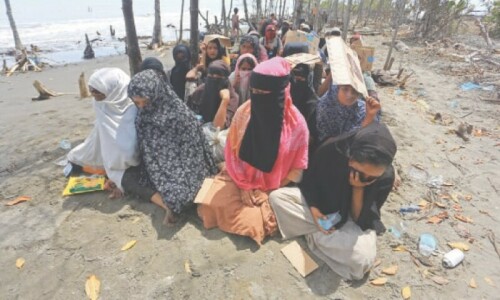LHOKSEUMAWE: Local officials reported that on Thursday, human traffickers left dozens of Rohingya refugees, including children, stranded on a shoreline in the westernmost part of Indonesia. Additionally, six bodies were discovered nearby.
Every year, members of the minority that is being persecuted put their lives in danger on long, perilous sea journeys, frequently cramming into rickety boats in the hope of reaching Malaysia or Indonesia.
Saiful Anwar, a village official in East Aceh, stated that the refugees were abandoned before dawn on Thursday, approximately 100 meters from a beach in Aceh Province. He stated that the group consisted of 47 women, 37 men, and seven children. Locals discovered two bodies on the shore and four others floating in the water.
The community’s chief, Miftach Tjut Adek, stated that the 96 newcomers, including seven children, were still at the local beach in the eastern part of Aceh, which is on the island of Sumatra. They are still at the beach, so there is no solution at this time,” Miftach stated.
Refugees left by human traffickers 100 meters from a beach in the Aceh province “These people were stranded at around 4 a.m., according to information from residents. Saiful stated, “It seems like a boat brought them here.” He stated that eight sick refugees were transported for treatment.
Amrullah M. Ridha, acting district head for East Aceh, told reporters that the refugees would stay in tents on the beach until help arrived. The UN Refugee Agency (UNHCR) stated that it was aware of the arrivals but could not provide any additional details. Reporters were informed by Acting Aceh Governor Safrizal that the most recent arrivals were the result of “human trafficking mafia activity.”
This is the third group of refugees to arrive in western Indonesia this month, following 140 arrivals in North Sumatra province and 150 in Aceh.
The risky 4,000-kilometer journey from Bangladesh to Malaysia is attempted by thousands of Rohingya every year, fueling a multimillion-dollar human smuggling operation that frequently includes stops in Indonesia.
Indonesia says it cannot be forced to take in refugees and is not a signatory to the UN refugee convention. Instead, it asks its neighbors to share the burden.
Numerous Acehnese, who themselves have recollections of many years of ridiculous clash, are thoughtful to the predicament of their kindred Muslims, yet others say their understanding has been tried by the yearly appearances.
Last week, approximately 300 Rohingya arrived in Indonesia’s Aceh and North Sumatra provinces. The refugee agency UNHCR has requested that the Indonesian government ensure their safety. A spokesperson in Indonesia stated that UNHCR and local authorities were assisting the Rohingya.
Many Rohingya Muslims leave Myanmar on rickety boats for Thailand, Indonesia, Malaysia, and Bangladesh between October and April, when the seas are calmer.
The Rohingya leave Myanmar, a country with a majority Buddhist population, where they are treated like intruders from South Asia, denied citizenship, and abused. According to UNHCR data, more Rohingya people arrived in Indonesia the previous year—over 2,000—than in the previous four years. Because of the flurry of newcomers, some of them were turned down in Indonesia.



